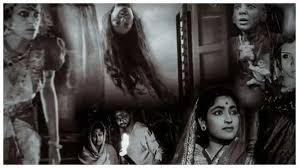Explore the psychological depth of Indian thrillers, uncovering their unique storytelling, cultural influences, and the fear-fascination dynamic that keeps audiences hooked.
Indian thrillers have captivated audiences for decades, blending suspense, psychological complexity, and cultural depth. Unlike Hollywood’s fast-paced, action-packed narratives, Indian thrillers often delve into the intricacies of the human psyche, fear, and societal taboos. The fusion of mystery, emotion, and cultural storytelling creates a unique cinematic experience that keeps viewers engaged and intrigued. But what makes Indian thrillers so psychologically compelling? Let’s explore the fear and fascination embedded within these films and their impact on audiences.
The Evolution of Indian Thrillers
Indian thrillers have evolved significantly over the years, adapting to changing audience preferences and global influences. From the early noir-style films of the 1950s to the modern psychological thrillers of today, the genre has grown to include elements of horror, crime, and supernatural themes. Some key milestones in the evolution of Indian thrillers include:
1. Early Influences (1950s-1970s)
- Films like Mahal (1949) and Bees Saal Baad (1962) introduced gothic horror elements and eerie storytelling.
- Directors like Guru Dutt and Satyajit Ray infused psychological depth into suspense-driven narratives.
2. The Rise of Psychological Thrillers (1980s-2000s)
- Movies such as Kaun? (1999) and Gupt (1997) played with audience perceptions, challenging traditional hero-villain archetypes.
- The rise of directors like Ram Gopal Varma and Sriram Raghavan brought a new wave of neo-noir thrillers.
3. Modern-Day Thrillers (2010s-Present)
- Films like Andhadhun (2018) and Drishyam (2015) showcase masterful storytelling, combining suspense with psychological manipulation.
- Streaming platforms have enabled filmmakers to experiment with bold narratives, breaking conventional storytelling norms.
The Psychological Elements in Indian Thrillers
The allure of Indian thrillers lies in their deep psychological themes, which tap into the primal fears and emotional conflicts of audiences. These elements include:
1. The Fear of the Unknown
Many Indian thrillers play with ambiguity, leaving audiences questioning what is real and what is not. Films like Kahaani (2012) and Talaash (2012) blur the lines between reality and illusion, creating an unsettling sense of unpredictability.
2. Moral Dilemmas and Ethical Quandaries
Unlike straightforward crime thrillers, Indian films often force characters into moral dilemmas. Drishyam (2015) presents a gripping tale of deception and justice, where the protagonist must outsmart the legal system to protect his family.
3. Mind Games and Psychological Manipulation
Films like Andhadhun (2018) keep audiences on edge by constantly shifting perspectives. The protagonist’s reliability as a narrator is questioned, making the audience an active participant in the suspense.
4. Cultural and Social Influences
Indian thrillers often weave in cultural nuances, addressing themes like family honor, corruption, and supernatural beliefs. The use of mythology and folklore enhances the psychological impact, making the narratives more relatable to Indian audiences.
Bollywood vs. Hollywood: How Thrillers Borrow and Adapt Stories
While Hollywood thrillers are known for their slick production and global appeal, Indian thrillers stand out due to their emotional depth and cultural storytelling. The key differences and influences include:
1. Storytelling Approach
- Hollywood thrillers like Se7en (1995) and Gone Girl (2014) rely on high-intensity action and psychological twists.
- Indian thrillers incorporate melodrama and moral conflicts, making them more emotionally engaging.
2. Character Development
- Hollywood tends to create morally ambiguous characters, while Indian films often emphasize emotional motivations and familial bonds.
- Indian thrillers like Badla (2019) adapt Western narratives but add cultural layers for a more localized impact.
3. Narrative Pacing
- Hollywood thrillers are typically fast-paced, focusing on high stakes and resolution.
- Indian thrillers take their time to build suspense, using music and symbolism to deepen emotional connections.
The Fear-Fascination Dynamic in Indian Thrillers
The reason why Indian thrillers are so effective lies in the balance between fear and fascination. The audience is drawn into unsettling narratives yet remains captivated by the intricate storytelling. Some psychological reasons include:
1. Catharsis Through Fear
Watching thrillers allows audiences to experience fear in a controlled environment, offering psychological relief.
2. Suspense and Emotional Investment
The combination of strong character arcs and unpredictable plot twists keeps viewers emotionally invested.
3. Cultural Relevance
Themes rooted in real societal issues, such as corruption, honor, and revenge, make Indian thrillers resonate deeply with audiences.
The Future of Indian Thrillers
With the rise of streaming platforms and experimental storytelling, Indian thrillers are poised for an exciting future. Key trends include:
1. Increased Global Recognition
- Indian thrillers are gaining international acclaim, with films like Andhadhun being adapted into global versions.
2. Technological Advancements
- AI-driven storytelling and data analytics will help filmmakers understand audience preferences better, leading to more sophisticated narratives.
3. Diverse Storytelling
- The future will see more cross-genre experimentation, combining psychological thrillers with sci-fi, horror, and crime elements.
Indian thrillers masterfully blend fear and fascination, offering audiences a deep psychological experience. Through cultural storytelling, mind-bending narratives, and moral dilemmas, these films continue to push the boundaries of the thriller genre. As technology and global influences shape the future of Indian cinema, the psychological depth of Indian thrillers will only grow, keeping audiences intrigued and enthralled for years to come.
FAQ
1. What makes Indian thrillers unique compared to Hollywood thrillers?
Indian thrillers focus on emotional depth, cultural influences, and moral dilemmas, making them distinct from Hollywood’s action-oriented approach.
2. Which Indian thriller films are must-watch?
Some of the best Indian thrillers include Andhadhun, Drishyam, Talaash, Kaun?, and Kahaani.
3. Why do audiences find thrillers so fascinating?
Thrillers tap into human psychology, fear, and curiosity, keeping audiences engaged through suspense and unexpected twists.
4. How are Indian thrillers evolving with technology?
With AI-driven analytics and streaming platforms, filmmakers are experimenting with more intricate narratives and international collaborations.
5. Are Indian thrillers influenced by Western cinema?
Yes, many Indian thrillers take inspiration from Hollywood but add unique cultural and psychological elements to make them stand out.
